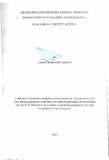| dc.description.abstract | This project report discusses determinants of fish farming projects production in Lurambi Constituency, Kakamega County. The report addresses why very many ponds became dormant after the implementation of the two phases of Economic Stimulus Project. The research methods used descriptive survey research design, the study employed probability sampling techniques that involved the use of stratified and simple random sampling. The target population was 305, 300 pond owners and 5 extension officers. The study used the following research instruments; questionnaires, interview and observations.
The instruments addressed both contents and face validity. Reliability was ascertained through testing methods. The study analyzed data using frequency and percentages and also employed SPSS (X) Professional for further statistical analysis and to find correlations between the variable and production. The findings of the study were that Technical Support, Financial Management, Cultured Species and level of education and training on fish farming are key factors to put into consideration before starting projects such as fish farming. The study further found that majority of farmers were not aware of technical support that they should receive from Extension Officers since they had passive interaction with them.
Therefore lack of information affected many pond operators. The funds that were also received by the Fisheries Department for carrying out the project was inadequate and that budgeting was very important to farmers. The study also revealed the cultured species least contributed to the project production as most species were adaptable and had wide market acceptability; the only important thing was feeding a requirement which was found to be complex and expensive. Based on the findings of the research, level of education and training on fish farming, financial management and technical support are highly correlated with production . .Irrespective of the level of education all farmers needed training of fish farming.
The study therefore recommended that there is need to train the front line extension workers to provide effective extension services, there is need to revitalize credit schemes to cater for credit facilities to farmers, there is need to breed cat fish and tilapia together to avoid too much multiplication which make feeding requirements difficult, its contribution to knowledge is that age and time is an important factor in management of this projects. | en_US |

